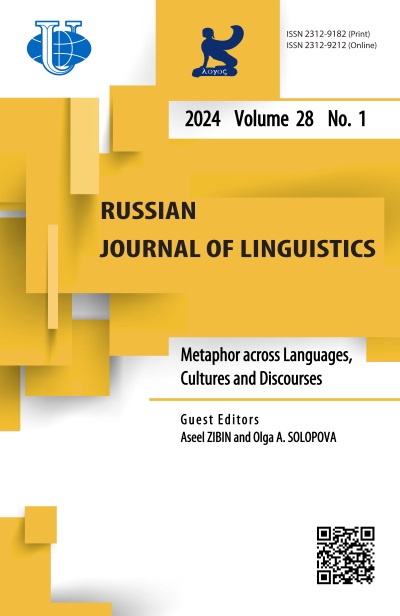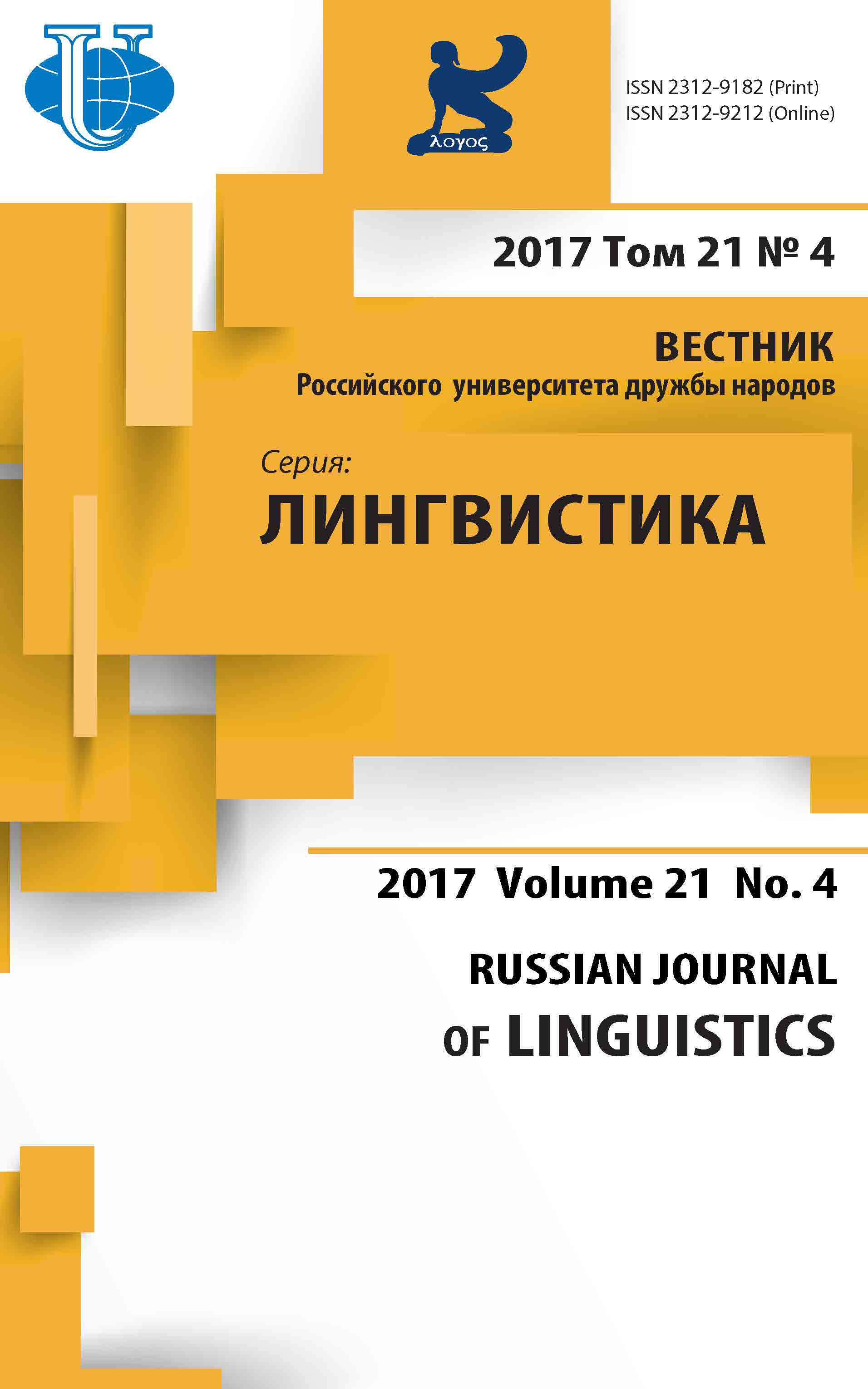THE EXPRESSION OF POLITENESS IN A BILINGUAL SETTING: EXPLORING THE CASE OF MALTESE ENGLISH
- Authors: Cremona M.1, Assimakopoulos S.1, Vella A.1
-
Affiliations:
- University of Malta
- Issue: Vol 21, No 4 (2017)
- Pages: 767-788
- Section: Articles
- URL: https://journals.rudn.ru/linguistics/article/view/17308
- DOI: https://doi.org/10.22363/2312-9182-2017-21-4-767-788
Cite item
Full Text
Abstract
About the authors
Martina Cremona
University of Malta
Email: martina.cremona.14@um.edu.mt
Martina Cremona is a graduate of Linguistics at the University of Malta. Research interests: sociolinguistics, politeness theory and cross-cultural studies. Msida, MSD 2080, Malta
Stavros Assimakopoulos
University of Malta
Email: stavros.assimakopoulos@um.edu.mt
Stavros Assimakopoulos is a Senior Lecturer in Linguistics at the University of Malta. Research interests: linguistics, philosophy and cognitive psychology, inferential pragmatics and discourse analysis. He recently edited two volumes: Pragmatics at its Interfaces (Mouton de Gruyter, 2017) and Current issues in Intercultural Pragmatics (John Benjamins, 2017; with Istvan Kecskes). Msida, MSD 2080, Malta
Alexandra Vella
University of Malta
Email: alexandra.vella@um.edu.mt
Alexandra Vella is a Professor of Linguistics at the University of Malta. Research interests: phonetics and phonology, particularly intonational phonology. Her main research focus is on prosody and intonation in Maltese and its dialects, and on the influence of the language background of Maltese speakers on the intonational structure of Maltese English. She is also interested in interlanguage phonology and in accent and dialect variation. Msida, MSD 2080, Malta
References
- Assimakopoulos, S. (2014) The Background of politeness universals. Russian Journal of Linguistics 18: 35-43.
- Blum-Kulka, Shshana & Elite Olshtain. (1984) Requests and apologies: A cross-cultural study of speech act realization patterns (CCSARP). Applied Linguistics 5: 196-213.
- Blum-Kulka, Sh. (1982) Learning how to say what you mean in a second language: A study of speech act performance of learners of Hebrew as a second language. Applied Linguistics 3: 29-59.
- Boersma, Paul & David Weenink. (2017) PRAAT: Doing phonetics by computer (Version 6.0.31). http://www.praat.org. Last accessed 30 August 2017.
- Bolinger, D. (1989) Intonation and its uses: Melody in grammar and discourse. California: Stanford University Press.
- Brincat Massa, M. (1986) Interferenze inglesi sulla lingua maltese. Journal of Maltese Studies 16: 45-52.
- Brown, P. &. Levinson S.S. (1987) Politeness: Some universals in language use. Cambridge: Cambridge University Press.
- Camilleri, Antoinette & Albert Borg. (1992) Is Maltese an endangered language? Paper presented at the 15th International Congress of Linguists. Laval University, Quebec.
- Camras, L. A. (1984) Children’s verbal and nonverbal communication in a conflict situation. Ethology and Sociobiology 5: 257-268.
- Caruana, C. Forthcoming. Conversational patterns in Maltese talk shows: A perspective on politeness. MA thesis: University of Malta.
- Cole, J. & Shattuck-Hufnagel S. (2016) New methods for prosodic transcription: Capturing variability as a source of information. Journal of the Association for Laboratory Phonology 7: 1-29.
- Cruttenden, A. (1997) Intonation (2nd ed.). Cambridge: Cambridge University Press.
- Cruttenden, A. (2001) Gimson’s pronunciation of English (6th ed.). London: Edward Arnold.
- Culpeper, J. (2011) Politeness and impoliteness. In Handbook of Pragmatics: Vol. 5: Sociopragmatics, ed. by Karin Aijmer & Gisle Andersen, 391-436. Berlin: Mouton de Gruyter.
- Gallaher, B. (2014) The speech act set of direct complaints in American and Russian cultures. Russian Journal of Linguistics 18: 167-177.
- Gazizov, R. A. (2014) Lexical ways of expressing explicit politeness in German linguoculture. Russian Journal of Linguistics 18: 76-84.
- Goffman, E. (1967) Interaction ritual: Essays on face to face behavior. New York: Anchor Books.
- Gu, Yueguo (1990) Politeness phenomena in modern Chinese. Journal of Pragmatics 14: 237-257.
- Kasper, G. & Rose. K. R. (2002) Pragmatic development in a second language. Oxford: Blackwell.
- Ladd, D. R. (1978) Stylised intonation. Language 54: 517-539.
- Ladd, D. R. (1996). Intonational phonology. Cambridge: Cambridge University Press.
- Lakoff, R. T. (1989) The limits of politeness: Therapeutic and courtroom discourse. Multilingua 8: 101-129.
- Laplante, D. & Ambady, N. (2003) On how things are said: Voice tone, voice intensity, verbal content, and perceptions of politeness. Journal of Language and Social Psychology 22: 434-442.
- Leech, G., Larina. T. (2014) Politeness: West and East. Russian Journal of Linguistics 18: 9-34.
- Leech, G. (1983) Principles of pragmatics. London: Longman.
- Lim, Tae-Seop. (1994) Facework and interpersonal relationships. In The challenge of facework: Crosscultural and interpersonal issues, ed. by Stella Ting-Toomey, 209-229. Albany, NY: State University of New York Press.
- Loveday, L. (1981) Pitch, politeness and sexual role: An exploratory investigation into the pitch correlates of English and Japanese politeness formulae. Language and Speech 24: 71-89.
- Mao, LuMing Robert. (1994) Beyond politeness theory: ‘Face’ revisited and renewed. Journal of Pragmatics 21: 451-486.
- Mifsud, M. (1995) Loan verbs in Maltese: A descriptive and comparative study. Leiden: E.J. Brill.
- Nespor, M. & Vogel. I. (2007) Prosodic phonology: With a new foreword. Berlin: Mouton de Gruyter.
- O’Connor, Joseph D. & Gordon F. Arnold. (1973) Intonation of colloquial English: A practical handbook (2nd edn). London: Longman.
- Pierrehumbert, J. (1980) The phonetics and phonology of English intonation. Ph.D. thesis: Massachusetts Institute of Technology.
- Salgado, E. F. (2011) The pragmatics of requests and apologies. Amsterdam: John Benjamins.
- Schelchkova, E. B. (2013) The speech act of invitation in the American and Russian communicative cultures (results of an empirical research). Russian Journal of Linguistics 17: 109-115.
- Sifianou, M. (1992) Politeness phenomena in England and Greece. Oxford: Clarendon Press.
- Vella, A. & Farrugia, P-J. (2006) MalToBI: Building an annotated corpus of spoken Maltese. In Proceedings of the 3 rd International Conference on Speech Prosody. Dresden.
- Vella, A. (2012) Languages and language varieties in Malta. International Journal of Bilingual Education and Bilingualism, 16, 532-552.
- Vella, A. (1995) Prosodic structure and intonation in Maltese and its influence on Maltese English. PhD thesis: University of Edinburgh.
- Vella, A. (2009) On Maltese prosody. In Introducing Maltese Linguistics: Selected Papers from the 1st International Conference on Maltese Linguistics, Bremen, 18-20 October, 2007, ed. by Bernard Comrie, Ray Fabri, Elizabeth Hume, Manwel Mifsud, Thomas Stolz and Martine Vanhove, 47-68. Amsterdam: John Benjamins.
- Watts, R. J. (2003) Politeness. Cambridge: Cambridge University Press.
- Wichmann, A. (2004) The intonation of please-requests: A corpus-based study. Journal of Pragmatics 36: 1521-1549.

















